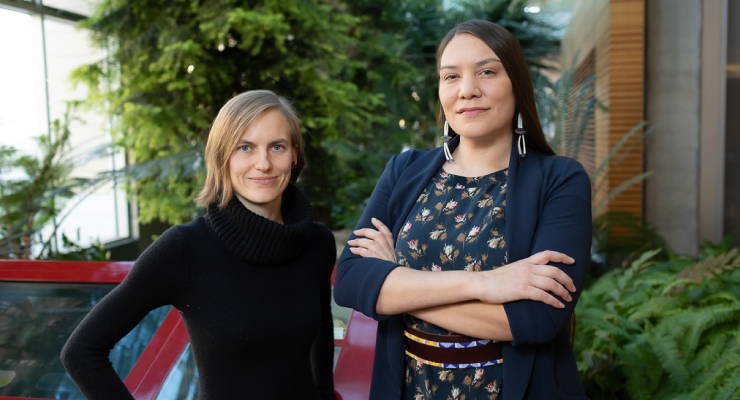
Nelson Institute welcomes Grace Bulltail, assistant professor of Native American environment, health, and community
Understanding the intersection of watershed management and tribal sovereignty is among the top research goals of Grace Bulltail, the newly named Nelson Institute assistant professor of Native American Environment, Health, and Community. Bulltail joins new colleagues from the School of Nursing and the School of Human Ecology as part of a multi-faculty hire to collaborate with tribal communities and sovereign Native Nations on a variety of initiatives.
A member of the Crow Tribe and a descendant of the Mandan, Hidatsa, and Arikara Tribes of Fort Berthold, North Dakota, Bulltail has spent much of her career studying the impact of oil and gas extraction on water quality and watershed management. A professional engineer and American Indian Science and Engineering Society (AISES) board member, Bulltail received a bachelor of science in civil and environmental engineering from Stanford University and a doctorate from the Department of Biological and Environmental Engineering in the College of Agriculture and Life Sciences at Cornell University.
During Bulltail’s doctoral work at Cornell, she researched the ways in which natural resource development in multi-jurisdictional watersheds throughout Montana, Wyoming, and Crow tribal lands impacted water quality. Following her graduation from Cornell, Bulltail continued her water quality research, becoming a postdoctoral fellow at Stanford University in the Department of Earth System Science, where she investigated the water quality impacts of oil and gas development on tribal lands. In her new role at the University of Wisconsin-Madison, Bulltail hopes to continue researching water policy while focusing on transboundary watersheds and the land tenure challenges present in Wisconsin.
“Moving forward, I really want to look at land use and how water management is tied to land use,” Bulltail said.
Specifically, Bulltail said she is interested in addressing gaps in how tribal waterways are inventoried by the state and how this impacts regulations around tribal waters. In particular, Bulltail said that most tribal waterways are not inventoried or listed in state surveys so the Environmental Protection Agency is not in a position to put any regulations on waterways that have not been inventoried. Instead, tribal leaders can elect to set their own water quality standards or list the water as impaired. Bulltail hopes to better understand how tribes are managing these options and how land tenure impacts these decisions.
Bulltail will also be working with American Indian Studies and the Department of Biological Systems Engineering in the College of Agricultural and Life Sciences. Bulltail is also hoping to connect with others across campus to continually improve graduate education research.
Bulltail said, “I’m looking forward to learning more about the issues specific to this region and being a part of a campus with a strong agriculture focus.”
Nelson Institute and forest and wildlife ecology welcome Assistant Professor Zuzana Burivalova
Identifying and understanding the best ways to preserve biodiversity in tropical forests is at the heart of Zuzana Burivalova’s research. A 2015 graduate of ETH Zurich and a newly named Nelson Institute and Forest and Wildlife Ecology assistant professor, Burivalova will be researching soundscapes in an effort to better understand how human behavior is impacting biodiversity within tropical rainforests.
A soundscape is a sound or combination of sounds that forms or arises from an immersive environment. Burivalova uses this term to describe the various animal calls that can be heard throughout the forest. Using new tools such as bioacoustic recorders and collaborating with a team of statisticians, computer scientists, and engineers, Burivalova captures these sounds and then analyzes them to learn what, and how many, species are present as well as how those numbers differ as humans use the forest.
“Tropical forests are very noisy, especially in the morning, but we’ve noted that as human behavior impacts it, the forests become quieter,” Burivalova said. “It’s my goal to develop a tool that measures the soundscape and helps us to determine what a normal soundscape is, how it is impacted by seasonality, and how it is impacted by human behavior.”
According to Burivalova, about half of all terrestrial species can be found in tropical forests, so gaining a greater understanding of how these species are being impacted will be a positive step toward the conservation of biodiversity. Burivalova is also interested in using soundscapes to learn which conservation strategies succeed and fail in tropical forest conservation, and where traditional field methods are not sufficient.
To better understand which conservation strategies are working, Burivalova is compiling an interactive database of studies that showcases patterns of success as well as failures for conservation efforts around the tropical world. She works with journalists to make these into accessible stories.
“I’m excited to be a part of both the Nelson Institute and Forest and Wildlife Ecology as it’s a great way to combine my background in ecology with interdisciplinary research and conservation,” Burivalova said. “It’s wonderful to feel that my interdisciplinary research is supported and that I’m at a place that values applied research. I frequently collaborate with conservation NGOs (non-governmental organizations) and I know how important it is for them to have research results that are directly relevant to the on-the-ground conservation challenges they face. I hope to keep providing that.”
Bulltail and Burivalova are both affiliates of the Nelson Institute Center for Sustainability and the Global Environment (SAGE).